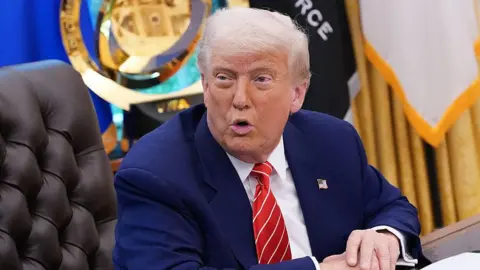
 Getty Images
Getty Images
Donald Trump has signed a ban on travel to the US from 12 countries citing national security risks, according to the White House.
The US president said the list could be revised if "material improvements" were made and additional countries could also be added as "threats emerge around the world".
This is the second time he has ordered a ban on travel from certain countries.
He signed a similar order in 2017, during his first term in office.
Which countries are affected?
Trump has signed a proclamation banning travel to the US from nationals of 12 countries:
- Afghanistan
- Myanmar
- Chad
- Republic of the Congo
- Equatorial Guinea
- Eritrea
- Haiti
- Iran
- Libya
- Somalia
- Sudan
- Yemen
There are an additional seven countries whose nationals face partial travel restrictions:
- Burundi
- Cuba
- Laos
- Sierra Leone
- Togo
- Turkmenistan
- Venezuela
The ban takes effect on Monday at 12:01 a.m. (05:00 BST), a cushion that avoids the chaos that unfolded at airports nationwide when a similar measure took effect with virtually no notice eight years ago.
Why has a ban been announced?
The White House said these "common sense restrictions" would "protect Americans from dangerous foreign actors".
In a video posted to his Truth Social website, Trump said the recent alleged terror attack in Boulder, Colorado "underscored the extreme dangers" posed by foreign nationals who had not been "properly vetted".
Twelve people were injured in Colorado on Sunday when a man attacked a group gathering in support of Israeli hostages, throwing two incendiary devices and using a makeshift flamethrower.
The man accused of carrying out the attack has been identified as an Egyptian national.
What has been the reaction to the ban?
Trump's latest order, which is expected to face legal challenges, drew a swift response, at home and abroad.
Somalia promised to work with the United States to address any security issues.
In a statement, Somali ambassador to the US, Dahir Hassan Abdi, said his country "values its longstanding relationship" with America.
Venezuela's Interior Minister Diosdado Cabello warned that "being in the United States is a great risk for anyone, not just for Venezuelans".
Democrats were quick to condemn the move.
"This ban, expanded from Trump's Muslim ban in his first term, will only further isolate us on the world stage," Pramila Jayapal, a Democrat congresswoman from Washington, says in a social media post.
Another Democrat, congressman Don Beyer, says Trump "betrayed" the ideals of the US' founders.
What happened last time?
Trump ordered his original travel ban during his first term in the White House in 2017.
It featured some of the same countries as his latest order, including Iran, Libya and Somalia.
Critics called it a "Muslim ban" as the seven countries initially listed were Muslim majority.
The White House revised the policy, ultimately adding two non-Muslim majority countries, North Korea and Venezuela.
It was upheld by the Supreme Court in 2018.
President Joe Biden, who succeeded Trump, repealed the ban in 2021, calling it "a stain on our national conscience."

 1 month ago
16
1 month ago
16










 English (US) ·
English (US) ·